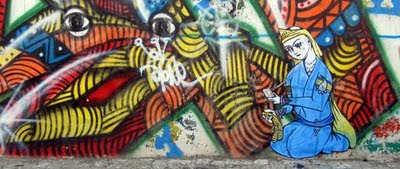
From France24:
"The most famous piece of Iranian graffiti is probably the deathly Statue of Liberty painted on the wall of the former US Embassy in Tehran. There's far more to street art than anti-American paintings however, and in the past two years, it's become more popular than ever."
Farhad Roozbeh (not his real name) is a graffiti artist from Tehran. He wishes to remain anonymous. He writes [and go here to view more graffiti]
"They are no legal surfaces to graffiti on in Tehran. Even if the owner of a house wanted an artist to paint the outdoor wall of his property, the police would be sent round to warn them that it's forbidden and the city council would then remove the painting. It's not about making the city look clean, it's about controlling it.
The police don't pay any more attention to street artists than they do other artists. Besides there are very few of us and we draw in secluded places; we're not in it for the fame. They haven't found a particular way to catch us yet. However, like other cultural ‘crimes', graffiti is considered a dissident activity. A graffiti artist caught by the police is sentenced in the same way as a political activist. Journalists, graphic designers; we all risk being imprisoned for what they call ‘the security of the nation'.
Many people here have taken up graffiti in the past two years. There are street artists as young as 12 in Tehran. I think that Farsi websites like irangraffiti.blogspot.com and kolahstudio.com are helping to promote graffiti and advise budding artists. We are influenced a lot by foreign styles - especially from the West. But we also try to inject a bit of eastern flare into our design".
Comments